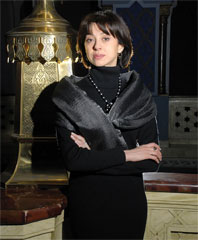Ballet, politicians, and national consciousness: Should art be free from the political agenda?
By Veronika Malinboym
Tuesday, January 12

Prima ballerina or a political figure by proxy?
Nina Ananiashvili was born in 1963, in Tbilisi, where she was enrolled in one of the city’s ballet schools. She then proceeded to study at the Bolshoi Ballet Academy, and upon graduation, Ananiashvili joined the Bolshoi Theatre troupe. Shortly after, Ananiashvili’s talent became known in almost every part of the world – her “Swan Lakes” and “Sleeping Beauties” and dreamy “Juliette“ would leave the audience applauding for a good 30 minutes after the performance had ended.
In 1988, Ananiashvili married then-Minister of the Foreign Affairs, Grigol Vashadze, and gave birth to the daughter Elena in 2006. The achievements of this dancer are countless and speak for themselves – one of the first Soviet dancers to perform as a guest soloist with the New York City Ballet, principal dancer at the American Ballet Theatre, and the principal dancer of the Houston Ballet.
Upon her return to Georgia in 2004, Ananiashvili took up a lead over the State Ballet of Georgia and has successfully staged more than 60 full-time ballet productions, saw a renewal of the state funding, partnered with various renowned choreographers who worked with the Georgian ballet troupe and took the SBG to tour across the US on numerous occasions. In the long list of Ananiashvili’s regalia, you will find Georgia’s top cultural award – The Oracle of Art, as well as the People’s Artist of Georgia award, and the People’s Artist of Russia award.
From first sight, it might seem like a success story of a talented artist – something that we, traditionally, prefer to take out of the context of the political disputes or the country’s national agenda. But art and politics are more intertwined than one might think, especially in the post-Soviet hemisphere.
Until recently, the husband and impresario of Ananiashvili, Grigol Vashadze, has enjoyed close political ties with an ex-President and the founder of the United National Movement – Mikhail Saakashvili. Deputy Minister of Foreign Affairs and the Minister of Culture, Monument Protection, and Sport, and later – the chairman of the UNM, Vashadze has long been one of the closest associates of Saakashvili. Moreover, Ananiashvili herself became the godmother to the ex-President’s son, Nikoloz. One might argue that this alone would be a reason enough to not take up an offer of joining a theatre in Russia if nothing else then to simply avoid jeopardizing the political career of one’s spouse. The ongoing situation is even more uncertain, since in December last year Vashadze has announced his decision to leave the chairmanship of the UNM party, and although Mrs. Ananiashvili stated that her decision had nothing to with the prior decision of her husband, such a decision is quite ambiguous at the very least.
Political and personal ties aside, there is one more, a much more significant factor that cannot be overlooked in this context. With the occupation of Georgian territories, and in the aftermath of the 2008 war, to which Vashadze himself referred to as a decision that Moscow will never be able to wash away from, one may see Ananiashvili’s actions as not particularly patriotic, at the very least. It seems like Ananiashvili herself was anticipating the criticism on the patriotic grounds to break out, as she stated in an interview with the Radio Free Europe/ Radio Liberty that her decision was concerned with the “creative work only”. She went on to reassure the audience that she remains to be a “big supporter” of her country and that she does not think that her actions could be used as a tool by the “Russian propaganda” to undermine Georgia.
Should one’s art mirror one’s national identity?
Many artists would probably agree that whether they like it or not, at some point, or throughout their lives, they maintain a certain degree of influence by the country of their origin. Such influence can be both positive or negative (although the former is much more common than the latter), and one’s art can be either inspired by or even mirror the realities of one’s Homeland. It is, therefore, easy to link such notion to the artists’ responsibility, as a public figure, social influencer, or the messenger of the creative art to uphold the principles and the overwhelming moods of the country where they come from – especially if the artist proclaims affection and a deeply rooted patriotism towards this country.
On the other hand, one can say that art exists outside of the borders and above politics. In the end, the only people that the artist is truly answering to is their respective audience, and such audience, regardless of who they are and where they are coming from, should be feeling and processing the creative processes that are offered to them in unison. As of right now. Novosibirsk theatre has temporarily suspended the contract with Ananiashvili on the grounds of her premature announcement about heading the theatre to the media, which the theatre has found disrespectful toward the troupe that Ananiashvili was not yet introduced to. As the situation is frozen, one question remains quite hot – does art unite or divide? And either way, does it even matter?
